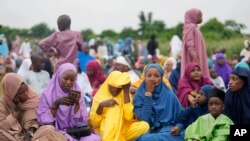Muslims in Nigeria are tightening their belts to mark Eid Al-Adha, the feast of sacrifice. Inflation triggered by President Bola Tinubu's decision to remove fuel subsidies in May has seen food prices jump, in some cases more than doubling. Many of Nigeria's Muslims can't afford to travel to see their families or buy traditional holiday foods.
Abuja-based trader Umar Abdulkadir was up early Wednesday to get his family ready for the Eid-al-Adha prayers and celebrations.
Abdulkadir had traveled by road three days earlier from the capital to his hometown in Northwest Kano state ahead of the holiday.
But he said his family has to cut down on its budget after a jump in food prices, especially for rams often sacrificed during the celebrations, and a tripling of transportation costs.
"Since they removed the fuel subsidy everything became expensive, even the ram. That's why it's so expensive and the transportation, too. Before we travel from Abuja to Kano for 4,500 [Naira], but this time around we paid 13,000 [Naira], even yesterday some people told me they paid 18,000 [Naira]."
Eighteen thousand naira equals about $23.
The price hike is mostly due to Nigeria's President Bola Tinubu's decision in May to end the fuel subsidies paid by the government for decades.
Nigeria was spending billions of dollars each month to keep petrol prices down at pumps.
Since the subsidy ended, the pump price has soared from 197 to 537 Naira per liter of petrol.
Food items and transport are most affected.
On Wednesday, the president urged Nigerians to endure, saying citizens must make sacrifices for the country's prosperity.
But Social Action Nigeria economist Isaac Botti says the president's decision to stop paying the subsidy was insensitive.
"Before the removal of subsidies, inflation rate was 23% and we know that any removal will compound the situation. So, a reasonable government would have set up parameters, put up mechanisms to cushion the effect. What programs, what palliatives do you have in place?"
Tinubu and his cabinet pledged to reset Nigeria's economy, tackle low growth and rising inflation.
Nigeria's economy plunged into recession twice during the eight-year rule of Tinubu's predecessor, Muhammadu Buhari.
On Tuesday the World Bank said more than seven million Nigerians may enter extreme poverty if the federal government does not make up for the end of the subsidy.
Botti agrees.
"Nigerians are experiencing an untold hardship with this policy. Nigerians will not be able to afford things they used to afford, particularly in the face of a stagnant wage system and skyrocketing inflation."
Nigerian authorities obtained a World Bank loan of $800 million to curb the impacts of removing the subsidies. The president's supporters believe things will normalize soon.






